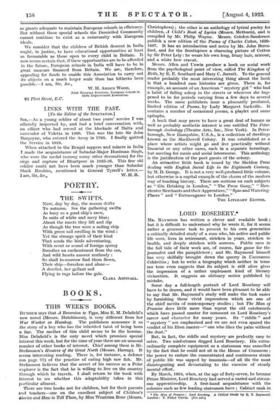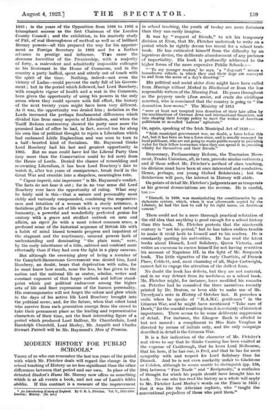LORD ROSEBERY.*
Ma. RAYMOND has written a clever and readable book ; but it is difficult to understand why he wrote it, for it seems rather a gruesome task to present to his own generation a critically detailed study of a man who, his active and public life over, lives in retirement, stricken in years, stricken hi health, and deeply stricken with sorrows. Public men in the full tide of their work are, of course, fair game for the journalist and the pamphleteer ; and Mr. Raymond himself has very skilfully brought down the quarry in Uncensored Celebrities ; but to write a biography which neither in tense nor tone even suggests that its subject is still alive gives the impression of a rather unpleasant kind of literary vivisection. It suggests an obituary notice published by mistake.
Some day a full-length portrait of Lord Rosebery will have to be drawn, and it would have been pleasant to be able to say that Mr. Raymond's study will make the task easier by furnishing those vivid impressions which are one of the chief merits of contemporary studies ; but The Man of Promise does little more than repeat the old catchwords which have passed muster for comment on Lord Rosebery's career and character for many years. Its " riddle " and " mystery " are emphasized and we are not even spared the verdict of his Eton master—" one who likes the palm without the dust."
But, in fact, the riddle and mystery are perfectly easy to solve. Two misfortunes dogged Lord Rosebery. His extra- ordinarily complete equipment as a statesman was cancelled by the fact that he could not sit in the House of Commons ; the power to endure the concentrated and continuous strain of public life was sapped by insomnia—of all ills the most disintegrating and devastating to the exercise of steady mental effort.
By March, 1894, when, at the age of forty-seven, he became Prime Minister, Lord Rosebery had served a varied and strenu- ous apprenticeship. A first-hand acquaintance with the colonies such as few leading statesmen have ; Cabinet rank in
• The Man of Promise. Lord Rosebery. A Critical Studs by E. T. Raymond. London : T. Fisher Unwin. [108. net4 1885 ; in the years of the Opposition from 1886 to 1892 a triumphant success as the first Chairman of the London County Council ; and the exhibition, in his masterly study of Pitt, of real thoroughness of method as well as of brilliant literary powers—all this prepared the way for his appoint- ment as Foreign Secretary in 1892 and for a further advance in prestige and influence. Then came the damnosa haereditas of the Premiership, with a majority of forty, a malevolent and admittedly impossible colleague as his lieutenant in the House of Commons, and in the country a party baffled, spent and utterly out of touch with the spirit of the time. Nothing, indeed—not even the victory of Lades--could prevent the early fall of his Govern- ment ; but in the period which followed, had Lord Rosebery, with complete vigour of health and a seat in the Commons, been given the opportunity of using his powers in the only arena where they could operate with full effect, the history of the next twenty years might have been very different. As it was, the opportunity was denied him ; isolation in the Lords increased the perhaps fundamental differences which divided him from many aspects of Liberalism, and when the Tariff Reform controversy showed the party once more the promised land of office he had, in fact, moved too far along his own line of political thought to rejoin a Liberalism which had embraced Little Englandism and was soon to turn to a half - hearted kind of Socialism. Mr. Raymond thinks Lord Rosebery had his last and greatest opportunity in 1903. But no man could have led the Liberal Party then (any more than the Conservative could be led now) from the House of Lords. Denied the chance of remoulding and re-creating Liberalism, it has been Lord Rosebery's fate to watch it, after ten years of omnipotence, break itself in the Great War and crumble into a shapeless, meaningless ruin.
" Capax imperii, nisi imperasset " is Mr. Raymond's verdict. The facts do not bear it out ; for in no true sense did Lord Rosebery ever have the opportunity of ruling. What may be fairly said is this—that a nature and personality most richly and variously compounded, combining the responsive- ness and intuition of a woman with a steely reticence, a fastidious gift for the art of life with a very warm and natural humanity, a powerful and wonderfully perfected genius for oratory with a grave and stedfast outlook on men and affairs, an esprit fin with a most robust common sense, a profound sense of the historical sequence of British life with a habit of mind biased towards progress and impatient of the stagnant and the reactionary, unusual powers both of understanding and dominating " the plain man," were, by the early inheritance of a title, cabined and confused more effectually than if they had seen the light in a gipsy caravan.
But although the crowning glory of being a member of the Campbell-Bannerman Government was denied him, Lord Rosebery, no doubt, bears that deprivation with calm, for he must know how much, none the less, he has given to the nation and the national life as orator, scholar, writer and constant exponent of that larger outlook and loftier stand- point which put political endeavour among the higher arts of life and finer expressions of the human personality. His contemporaries will not forget the colour and glow which in the days of his active life Lord Rosebery brought into the political scene, and, for the future, when that select band who survive from each generation emerge from the crowd to take their permanent place as the leading and representative characters of their time, not the least interesting figure of a period which produced Lord Balfour, Mr. Chamberlain, Lord Randolph Churchill, Lord Morley, Mr. Asquith and Charles Stewart Parnell will be Mr. Raymond's Man of Promise.



































 Previous page
Previous page